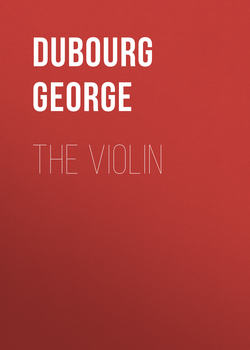The Violin

Реклама. ООО «ЛитРес», ИНН: 7719571260.
Оглавление
Dubourg George. The Violin
PREFACE TO THE PRESENT EDITION
CHAPTER I. ORIGINAL AND EARLY HISTORY OF THE VIOLIN
CHAPTER II. THE ITALIAN SCHOOL
CHAPTER III. PAGANINI
CHAPTER IV. THE FRENCH SCHOOL
CHAPTER V. THE GERMAN SCHOOL
CHAPTER VI. THE ENGLISH SCHOOL
CHAPTER VII. AMATEURS
CHAPTER IX. ON THE CONSTRUCTION OF THE VIOLIN
CHAPTER X. MISCELLANEOUS ANECDOTES, COLLECTED SCRAPS, ECCENTRIC VARIETIES, ETC
ADDENDUM. FEMALE VIOLINISTS
Отрывок из книги
The Fiddle Family, like other tribes that have succeeded in making a noise in the world, has given exercise to the ingenuity of learned theorists and time-seekers, who have laboured to discover for it an origin as remote from our own era, as it is, I fear, from any kind of truth. It has probably been conceived that the Fiddle, associated as he has been, from generation to generation, with jigs, country-dances, fairs, junketings and other rusticities, had descended too low in the scale of society – that he had rendered himself, as Shakspeare for a while did his own genius, “stale and cheap to vulgar company” – and that he required to be reminded of his primitive dignity, and of his very high ancestral derivation – if he had any. This latter point was of course to be first established; but, as your zealous antiquary is a wholesale dealer in time, and is never at a loss for a few centuries to link his conjectures to, the matter was easy enough; indeed, the more doubtful, the better, since doubt is the very life of theory. Accordingly, we have been invited to fall back upon “the ancients,” and to recognize the Epigonion as the dignified and classic prototype of our merry and somewhat lax little friend, the Fiddle. To certain ancient Greek tablets relative to music, which have been somewhere brought to light, Professor Murchard has minutely assigned the date of 709 years before the Christian era; and the following passage, Englished from his translation, is stoutly alleged by the antiquarian advocates of the glories of the violin race: – “But Pherekydes began the contest, and sat himself down before all the people, and played the Epigonion; – for he had improved the same; and he stretched four strings over a small piece of wood, and played on them with a smooth stick. But the strings sounded so, that the people shouted with joy.”
This is plausible enough, but far from conclusive. It is but the outline of a description, and admits of various modes of filling up. If the instrument partook at all of the violin character, it might seem, from the reference which its name bears to the knees, to have been the rude progenitor of either the double-bass or the violoncello, which have both, as is well known, their official post between the knees: but then, the prefix of ἐπί would denote that it was played upon the knees of the artist. “Very well,” says the antiquarian; “it was a fiddle reversed.” “Nay, Dr. Dryasdust, if you yourself overturn what you are about, I have no need to say more.” Au reste, let any body stretch four strings over a small piece of wood, and play on them with a smooth stick, and then take account of what it comes to. No, no; whatever the Epigonion may have been to the Greeks, he is nothing to us: he may have been a respectable individual of the musical genus of his day, when people blew a shell or a reed, and called it music; but we cannot for a moment receive him as the patriarch of the Fiddle Family. As soon should we think of setting up Pherekydes against Paganini.
.....
Then follows, in Hone’s Book, a further illustration of this curious custom, in “numerous verse” – but the prose account is here sufficient.
The dialogue in the old puppet dramas (says Strutt) were mere jumbles of absurdity and nonsense, intermixed with low immoral discourses passing between Punch and the fiddler, for the orchestra rarely admitted of more than one minstrel; and these flashes of merriment were made offensive to decency by the actions of the puppet. In the reign of James II, there was a noted merry-andrew named Philips; “This man,” says Granger, “was some time fiddler to a puppet-show; in which capacity he held many a dialogue with Punch, in much the same strain as he did afterwards with the mountebank doctor, his master upon the stage. This zany, being regularly educated, had confessedly the advantage of his brethren.”
.....